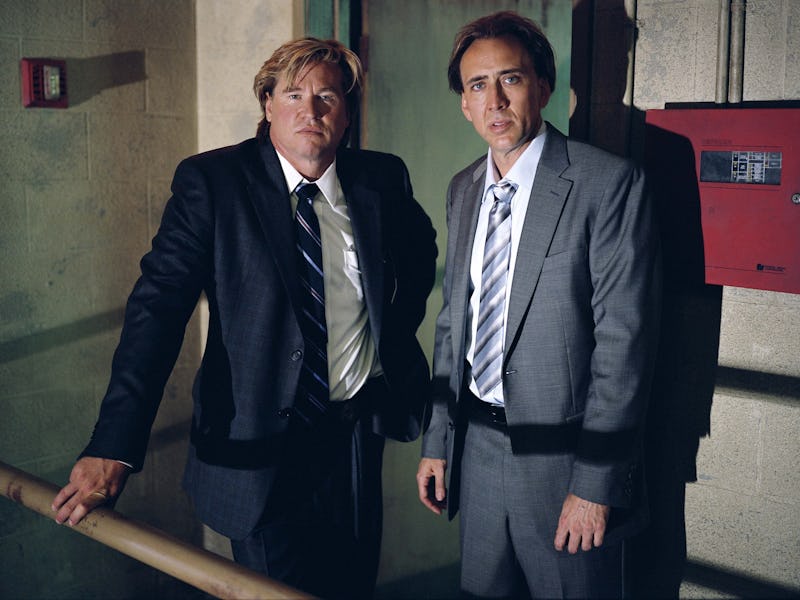In 2009, Nicolas Cage Made an Insane Yet Thoughtful Thriller
When Cage’s manic energy is channeled for good, everybody wins.

It’s a missed opportunity that Nicolas Cage’s first role as one of Universal’s Classic Monsters isn’t Frankenstein, as his performance in Werner Herzog’s Bad Lieutenant: Port of Call New Orleans provides robust scaffolding for a turn as The Monster. He’d make a respectable Victor Frankenstein or Igor too, so let’s hope for a gutsy auteur to triple-cast him in a high-concept outré take on Mary Shelley’s classic novel. For now, we have Cage’s blueprint of what could be, packaged in a post-Katrina black comic crime masterpiece.
Bad Lieutenant is dominated by Cage’s frame. Most people won’t reach for “tall” as their first descriptor of Cage; “crazy,” of course, is a popular one, or “zany,” or perhaps “unhinged.” But Cage stands at a sturdy six feet, and Peter Zeitlinger, Herzog’s cinematographer, takes every opportunity to emphasize his height, the way he stands out in the frame not simply because of his raw nerve but because he’s big. His character, corrupt and coked-out New Orleans Police Sergeant Terence McDonagh, cuts a commanding figure. He’s imposing, physically and figuratively. McDonagh looms over just about everyone he encounters, but he’s a larger-than-life spirit, too, one whose shadow is cast over all wherever he goes.
But it’s the loping gait, sloped shoulders, and hunched neck that first stand out. Terence doesn’t bother disguising or downplaying his stature. It’s one of his best assets. He’d rather stand taller, of course, but a back injury sustained during Bad Lieutenant’s opening scene sees to that; saving lives doesn’t come without cost, and jumping into a flooded prison to save a prisoner, Chavez (Nick Gomez), from certain death costs McDonagh his back.
Facially, there are two ways to play McDonagh’s condition. You can wear a constant, mild grimace to suggest inconveniencing pain, or you can simply stare. Cage stares. His form does the rest of the talking. Even under duress from his ruined lumbar, McDonagh dwarfs everyone else around him, a literal expression of the way he dominates with force. Even the threat of power has power. Bad Lieutenant is deeply invested in American policing, couched in a semi-caricature of corrupt cop culture that just toes the line enough to feel extravagant without sacrificing truth.
Stylized but honest is Cage’s sweet spot, and McDonagh is one of the most complex characters in his filmography. The “bad” in the title is evident from the first moments, when McDonagh mocks Chavez and bets on his chances at survival with his partner Stevie Pruit (Val Kilmer). Then McDonagh tries to save the doomed Chavez, and our view on his morality shifts. We wonder if maybe he’s a better man than he first appeared, and Herzog, working off of a script by William M. Finkelstein, seems to think so too.
Cage, in one of his more restrained scenes.
But McDonagh’s display of heroism is the start of an ethical rollercoaster. In one scene, he’ll shake down a club-going trust fund kid (Sam Velasquez) and his girlfriend (Katie Chonacas) for their illegal narcotics, segueing into impromptu public cuckoldry; in the next, he’s chastising Pruit for screwing up an interrogation with a witness who might be able to lead them to the men responsible for massacring a family of Senegalese immigrants. McDonagh tries to follow the motto etched into his precinct’s exterior: “This is a government of law, not of men.” He, a man, is the problem. Law comes second to his addiction, which is a consequence of his back injury, which was a consequence of putting the law first.
Bad Lieutenant’s presentation of one drug-addicted officer struggling to do the right thing in a system designed to prevent the right thing from being done, and in an era of police brutality layered over environmental catastrophe, is surprisingly subtle. Herzog transmits his themes subconsciously; there are no grand speeches about class inequality or racially biased policing. There’s only the sense that McDonagh alone wants justice for the slain immigrant family, and that his escalating transgressions are a product of the system’s apathy and inadequacy.
Cage’s face tells the story in every scene.
Herzog is the only choice for directing a movie like this, where the spirit of New Orleans — eerie but earthly, abutting the land of the dead but audaciously alive — is central to its tone and character. New Orleans is a unique slice of America. Likewise, Cage is his own actor, and there’s no one out there who can equal his zest. Between the director and his star, no need arises to overstate Bad Lieutenant’s case about the period in American history the film captures; post-Katrina’s intricacies and tragedies are made clear as the narrative unfolds. A few people had too much, everyone else had too little, and Black New Orleanians were an afterthought in the wake of an unprecedented disaster.
Besides, to make that case, Herzog and Cage would have to make Bad Lieutenant a didactic, grounded bore. There are a lot of words well-suited for qualifying this film: dreamy, surreal, tawdry, idiosyncratic, incisive. But boring? Not at all. That one rolls right off of Cage’s slanting body.